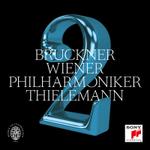|
Back
01/03/2022
Anton Bruckner: Symphony No. 2 in C minor, WAB 102 (Carragan Edition)
Vienna Philharmonic Orchestra, Christian Thielemann (conductor)
Recording: Musikverein, Vienna, Austria (April 25-28, 2019) – 0’58
Sony Classical G010004595494F
 < <
   
Christian Thielemann is quoted in the booklet, tellingly, as saying of Bruckner, apparently in general: “I find this music very hedonistic.” Of course there is more to Bruckner than dour solemnity, but I have always—before and after I came to love the music—found it to be marked by a great austerity that one doesn’t find in Wagner, for all the two composers’ affinities in harmonic language and orchestral scale. This austerity translates into a dramatic or at least a moral sense of urgency: even if thematic development can seem static and the musical argument fitful by the standards of classical sonata form, a sense of direction is always more or less evident, in hindsight if not in the moment, in a Bruckner symphony. Even when the music seems episodic, Bruckner never simply wallows in the moment. Thielemann’s remark quoted above explains, to my mind, the greatest liability of his approach to the composer: a lack, however subtle, of sustained dramatic urgency. We hear the tenderness and sometimes even the mystery of the music highlighted, its textural weight and grandeur, but less of its dramatic impetus, the struggle that often lies just beneath the surface. The sunlight in the music thus sometimes fails to move without darkness as a real foil.
Fortunately, this is less of a liability in the Second Symphony than elsewhere. In this, for me the most moving of Bruckner’s early published symphonies, the composer already shows the mastery of lyrical tenderness so evident in later masterworks, and a strong sense of drama—yet the scale is not yet epic. I would even suggest that as a basically lyric symphony, it is more effective than the extremely popular Seventh, whose voice is in some ways too gentle throughout to fill its massive, epic structure. The Second’s more modest structure, by contrast, flatters Bruckner’s melodic inspiration—a quality surely not foremost in the composer’s palette, but there all the same. Here, Thielemann’s hedonistic Bruckner comes alive. From the start of the first movement, the playing sings—and tonally and technically, the Vienna orchestra is as alluring as ever. We get, in short, a polished, virtuosic, and musical reading of a disarmingly lovely work. Thielemann is not the last word here in sheer personality of phrasing, but by the same token he generally avoids his occasional fault of fussy, momentum-killing phrasing; there is arguably a bit of this in the quiet opening of the finale, which could build up more anticipation before the crescendo, and in the final coda, which is more straightforward than its counterparts in Bruckner’s later works and might benefit from more propulsion and less refinement. On the whole, though, this is as promising an addition as the Fourth to Thielemann’s ongoing Bruckner cycle.
Samuel Wigutow
|